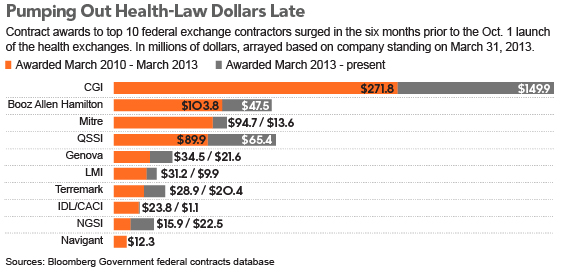 Although the Affordable Care Act has been law for three and a half years, one third of the funds going to the top contractors working on the federal exchanges were awarded in the six months before the new insurance marketplaces opened Oct. 1, a Bloomberg Government Analysis has found.
Although the Affordable Care Act has been law for three and a half years, one third of the funds going to the top contractors working on the federal exchanges were awarded in the six months before the new insurance marketplaces opened Oct. 1, a Bloomberg Government Analysis has found.
The torrent of late spending, almost $352 million of $1 billion in awards to the top 10 contractors, indicates the magnitude of the work still to be done as opening day approached, and helps explain the information technology problems that have dogged the exchange system since its launch.
In a typical IT project, spending ramps up to a peak, then trails off during the final phase.

The analysis runs only through Sept. 30. A subsequent 16-day government shutdown dried up new contracts and reduced the flow of contract record keeping to a trickle. But given the seriousness of the IT problems and the fact that most of the contracts are on a cost-plus basis, the companies almost certainly are in line for another burst of spending aimed at quickly making repairs.
RELATED: OBAMA AND SEBELIUS: 'THE DOG ATE MY HOMEWORK'
In the meantime, the administration is turning to a low-technology fallback. In June, officials signed a $114 million contract with the U.S. subsidiary of London-based Serco Group Plc to, among other things, run a mailroom to handle paper applications for the 2014 coverage year. Just days before the Oct. 1 opening of exchanges, it made a second $87 million award to expand the company’s services.
TOP CONTRACTORS
The BGOV analysis relied on a General Accountability Office study to identify the top 10 contractors for exchanges in the 36 states where the federal government is either wholly or largely responsible for operating the new marketplaces at least through 2014.
But unlike the GAO study, which focused solely on contracting for the exchanges and a related data services hub, BGOV used its federal contracts database to look at all health law-related contract awards to the firms since the ACA was enacted in March 2010.
RELATED: OBAMACARE DEADLINE PUSHED BACK 6 WEEKS
It included all awards where the acronym “ACA,” or the names or acronyms of programs closely related to the law appeared in the contract descriptors. It excluded all contracts where a direct link could not be made to the law, although it assumed that most recent IT awards by the Department of Health and Human Services are ACA-related because the law’s implementation has consumed an increasing share of the department’s time and resources.
LAST-MINUTE SPENDING
The accompanying chart illustrates the dimensions of the administration’s last-minute spending. It compares the dollar amount of contract awards to each of the companies in the 36 months from the law’s enactment in late March 2010 through the end of March 2013, and awards for the subsequent six months through Sept. 30.
The largest of the federal exchange contractors, CGI Federal Inc., a subsidiary of Montreal-based CGI Group Inc., received health law-related contract awards totaling $149.9 million during the six months through Sept. 30, according to the BGOV analysis. That was 35.5 percent of the $421.8 million it’s received since the law took effect in March 2010.
CGI designed large parts of the government’s healthcare.gov site, which is supposed to serve as a gateway to all of the exchanges and is the centerpiece of the federal exchanges. CGI has taken a substantial amount of the blame for the site’s troubles, which include locking up on consumers, erasing their data and sending multiple and confusing notices to insurers about who’s purchased their products.
'A-TEAM' ASSIGNED
HHS said Oct. 21 that it’s asked CGI to add staff and assign its “A-Team” to fix the site’s problems quickly. In addition to healthcare.gov, the government has made contract awards to the company to build separate IT systems that, among other things, track insurers’ exchange plans and keep tabs on which doctors and hospitals are receiving federal incentive payments to adopt electronic health records.
Quality Software Services Inc. or QSSI, a subsidiary of Minnetonka, Minnesota-based UnitedHealth Group Inc., the largest U.S. health insurer, received ACA-related contract awards totaling $65.4 million during the last six months, according to the analysis. This accounted for fully 42 percent of the health-law funding it’s been awarded since 2010, and pushed it from the No. 4 slot that it held among the firms examined by the analysis at the end of March to the No. 2 slot by the end of last month.
QSSI developed methods for making sure that consumers are who they say they are when they return to the online marketplace and for operating the data services hub responsible for checking consumers’ financial and citizenship information when they apply for federal subsidies to help buy health coverage.
One of the 10 firms examined, Navigant Consulting Inc. appears to have received no new ACA awards since March 31. Navigant is working on consumer outreach and data collection. Another, National Government Services Inc. or NGSI, a subsidiary of Indianapolis-based WellPoint Inc., was awarded almost 60 percent of its ACA total in the past six months. NGSI has contracts to work on, among other things, the Small Business Health Options Program or SHOP exchanges.
In aggregate, the 10 firms won a third of their health law-related contract dollars in the six months ended Sept. 30.
Besides showing the rush to issue contract awards in the months leading up to the opening of exchanges, the BGOV analysis also revealed that the implementation of the health law is costing substantially more than generally is portrayed.
Although the GAO made clear that its study focused solely on the costs of implementing the federal exchanges and the data services hub, its $394 million tally for work through March 31 has been widely cited as the price tag for the entire launch of the law. But in looking at the full range of ACA-related contracts for just 10 firms, the BGOV analysis found more than $1 billion worth of contract awards.
This article originally appeared in Bloomberg Government. Peter Gosselin is a senior health-care policy analyst with Bloomberg Government.




